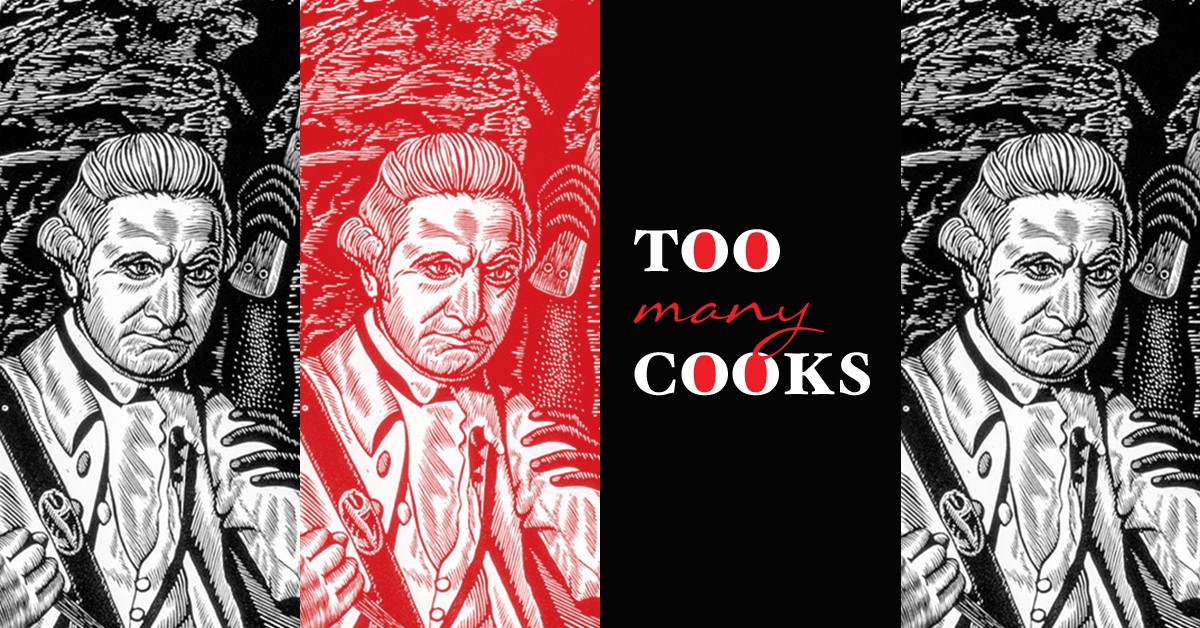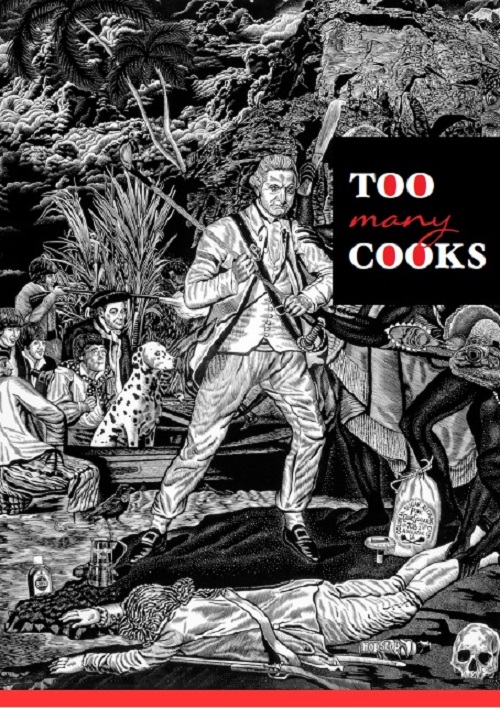Summary |
This online exhibition is presented by the Plimsoll Gallery and Fine Art Collection in collaboration with the Office of the Pro Vice Chancellor, Aboriginal Leadership, University of Tasmania |
|---|---|
Start Date |
Aug 22, 2020 |
Venue |
Plimsoll Gallery virtual exhibition |

Image Credit: Rew Hanks,The Conquest (detail), 2013 , linocut,100 x 75 cm ,edition of 30 courtesy the artist and Michael Reid Sydney + Berlin
Too Many Cooks: conflicting narratives in Australia’s visual histories.
Plimsoll Gallery virtual exhibition launch to coincide with the date that Lieutenant James Cook, captain of HMB Endeavour, claimed the eastern portion of the Australian continent for the British Crown in 1770, naming it New South Wales.
In April 1770, Lieutenant James Cook sailed from New Zealand with the intention of landing on the coast of Van Diemen’s Land (Tasmania). The great navigator completely missed the coastline mapped by Abel Tasman 130 years before and instead made landfall on the Australian mainland, claiming the ‘entire east coast of New Holland’ as British territory on 22 August. Despite Cook’s secret instructions from the Admiralty to, ‘…with the Consent of the Natives … take possession in the Name of the King of Great Britain’, no such consent was obtained from the many nations of First People whose lands were annexed. Cook finally found Van Diemen’s Land on his third voyage, seven years later.
Too Many Cooks is an innovative project centred on an online exhibition that gathers responses by Indigenous and other artists over the past fifty years to the contested visual narratives of Australia’s history. Too Many Cooks celebrates connection to Country and culture, while interrogating Anglo-centric origin mythologies of Australia with a dramatic selection of artworks and archival material from the University of Tasmania’s Cultural Collections. Together with loans from internationally renowned artists, private collections and the Allport Museum and Art Gallery, this material underlines the importance of visual art in informing and reflecting social processes that define Australia’s cultural and political identity.
The visit by Cook is still commonly recognised as the ‘discovery’ of Australia, and the arrival of the British First Fleet in January 1788 as the ‘founding of modern Australia’. Like Cook’s disregard for his Admiralty instructions, both these events effectively ignored the prior occupation and sovereignty of Australia’s First People, instead imposing the doctrine of terra nullius, or ‘empty land’. Despite the Mabo Decision of the High Court of Australia, vestiges of terra nullius remain deeply embedded in Australia’s attitude to Aboriginal people and their rights, ensuring that Cook’s legacy lives on.
In 2020, to commemorate the 250th anniversary of Cook’s visit to Australia, extensive plans were put in place by government; with significant expenditure on redevelopment of Cook memorials, commemorative voyages around Australia and other public celebrations. Against this background, Australian Indigenous and other artists continue to produce creative works that maintain attention on unresolved social issues such as Black Deaths in Custody, and to emphasise the strength and continuity of Aboriginal culture and the ongoing struggle for justice.
Too Many Cooks acknowledges the essential importance of art in social history by incorporating a lasting learning resource. This includes a Welcome to Country at the site of Cook’s first landing in Tasmania, a 360-degree virtual gallery tour and curatorial floor talk, and 3D interactive visualisations of exquisite cultural objects. A diversity of educational resources offers insight on the science and art of European encounter with Indigenous Australia, and the life and death of Captain James Cook.
Curated by Professor Greg Lehman and Rachael Rose.
Project Manager: Jane Barlow
Install technicians: Josh Prouse and Reece Romagnoli-Townsend
Welcome to Country by Rodney Dillon. Rodney is a Palawa Elder from Tasmania, the Indigenous Rights Advisor for Amnesty International Australia, member of the Stolen Generations Alliance: Australians for Truth, Justice and Healing, and a former Aboriginal and Torres Strait Islander Commissioner (ATSIC) for Tasmania.
Curator floor talk by Professor Greg Lehman
We may be temporarily closed, but you can still enjoy the Too Many Cooks exhibition from your home!
Download Too Many Cooks catalogue :
Title: Too Many Cooks
Dimensions: 29.7 x 21.0 cm (portrait)
Authors: Greg Lehman, Ian Mclean and Julie Gough
Editor: Greg Lehman
Number of Pages: 100pp plus cover
Hardcover
Photogrammetry of a 3D scan conducted on the model paperbark canoe made by Uncle Rex Greeno
Artwork credit: Rex Greeno, model paperbark canoe, 2013, courtesy of the artist.
3D photogrammetry model: Michael Roach, Senior Lecturer, Life and Physical Sciences, University of Tasmania
Photogrammetry of a 3D scan conducted on the model Barramundi made by unknown artist
The exhibition is primarily funded by the Australian Government’s Indigenous Student Support Program to facilitate the creation of Indigenous curriculum material, and the training of Aboriginal students at the university. Additional funding is contributed by National Science Week and University of Tasmania Collections, with in-kind support provided by the School of Creative Arts and Media, the School of Earth Sciences, and the Office of the Pro Vice Chancellor, Aboriginal Leadership.

In the spirit of Reconciliation, the University of Tasmania respectfully acknowledges the lutruwita nations. The University also recognises the Aboriginal history and culture of the land and acknowledges and pays respect to Traditional Owners and Elders past, present and emerging of the land on which all UTAS campuses stand
.
